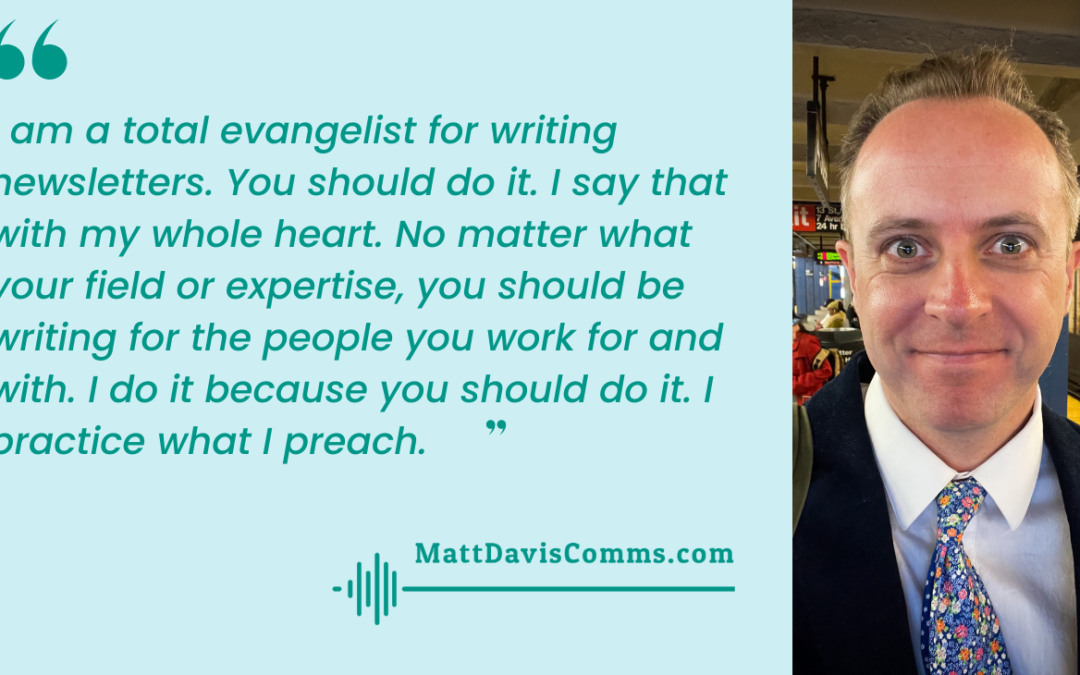I’ve been running The Comms Whisperer as a LinkedIn newsletter for more than two years, now. I am a total evangelist for doing these kinds of newsletters. On a pure per-client basis, spending a couple of hours each week writing these posts has paid for itself. It is worth doing. You should do it. I say that with my whole heart. No matter what your field or expertise, you should be writing for the people you work for and with. I do it because you should do it. I practice what I preach.
If you don’t do it, you’re hiding your light under a bushel and other people will take credit. They’ll get the opportunities you should have gotten. But there’s more to it. I’ve learned that writing regular updates for a core audience of subscribers is a journey. It forces you, after a while, to figure out who you are and what you’re doing here. You can’t hide from yourself. You have to go deeper. That helps everyone, including you. Here’s why…
Doing this for two years has given me some data—I can look over more than 100 posts. I can see which gained me the most subscribers. I can see which were the most engaged-with and shared.
There is an undeniable pattern. I engage the broadest audience when I let go. When I make myself a bit uncomfortable and open my heart a little. When I veer away from the safer topics people might expect of me. Yes, I can write about return-on-investment for public relations services. I can give advice for funders communicating with grantees. I can write about why editorial thought leadership works. But those are posts most people expect me to write. I am, after all, in the business of doing strategic communications for good causes.
And yet, when I look at the posts that have engaged the most people? It’s the one I wrote about going to a fish shop in Italy, reflecting on what it means to run a community business. Another post I wrote showing my laptop balanced on a box of diapers before a remote meeting did well. Something I wrote in the depths of a sinus condition about why the plot of Sleepless in Seattle makes no sense. A piece about dropping our son off at playgroup for the first time. A piece about the time I went to the emergency room with a heart condition. These are the things people comment on and share and read to the end. These, in other words, are the sorts of posts that my newsletter is encouraging me to write more of.
There’s a Bible passage in Matthew 10 about “losing your life to find it.” In other words, when you have a plan in life, or you hold certain things dear, those things might not pan out. I, for example, am intent on saving money for the future. But my wife started her own business in January and we’re pausing on that for a while. The trick is to get comfortable with a new reality. Not the life you were clinging onto. The actual life as it is playing out before you, day by day, and breath by breath.
In that sense I’m starting to see my regular newsletters as philosophical inquiries. Yes, they’re newsletters. But it feels like I’m going to both deepen my engagement with you, the reader, and be happier if I ask harder questions. What are we here for? What’s the point of it all? On one level, yes, it’s to see a profit-and-loss graph move in the right direction. This is content on LinkedIn, after all. But that’s never been the heart of life’s inquiries for me. Neither is it why I’m in the strategic communications business.
A friend of mine survived the Holocaust in Poland. Henry Pachnowski is one of the co-founders of United Stateless, a fantastic client doing incredible work. The Washington Post wrote about Henry recently. Late last year he had a heart attack and showed up at the USL convening in Philadelphia a few weeks later. He’s in his 80s. He told me the weirdest thing about his heart attack was there was “no epiphany.” I experienced something similar when I had what I thought was a near-death experience in July. It was annoying, yes. It scared the sh_t out of me, too. But in the end, I came out of it thinking I am doing the best I can in life. I’m taking it one day at a time and trying to be a good person. I don’t always measure up but I’m not too hard on myself about that, either. And that, when it comes down to it, is what we’re all here for. At least, that’s what I think. These are small realizations. Not huge ones. They still mean a lot.
How about you? What’s the point of it all, eh?


